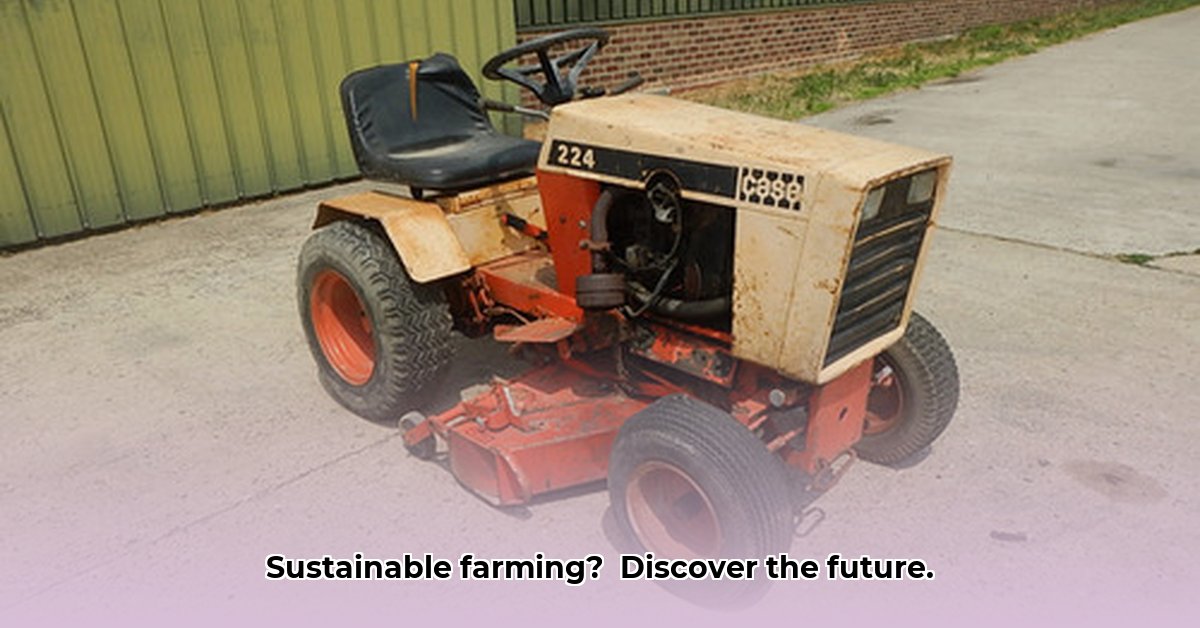
Choosing the right tractor is a pivotal decision for any farmer, impacting productivity, efficiency, and environmental responsibility. This comprehensive guide delves into the Case IH Farmall tractor series, examining its strengths and weaknesses to help you determine if it's the right fit for your operation. We'll compare it to competitors, focusing on versatility, fuel efficiency, technological integration, and sustainability. For collectors, check out these cool Farmall models.
Versatility: Adapting to Diverse Farming Needs
The Case IH Farmall line boasts impressive versatility. Models range from compact tractors ideal for vineyards and smaller farms to larger, more powerful machines suitable for extensive fieldwork. This wide range of sizes and power levels ensures there's a Farmall tractor suited to a variety of tasks and farming styles, from navigating tight spaces between rows of delicate crops to handling heavy-duty plowing. This adaptability is a significant advantage for farmers with diverse operations or changing agricultural needs.
Fuel Efficiency: Optimizing Costs and Reducing Environmental Impact
Fuel costs significantly impact farm profitability. While precise fuel consumption figures vary by model and workload, Case IH emphasizes the fuel efficiency of its Farmall tractors. This translates to lower operating costs and a reduced carbon footprint, aligning with the growing importance of sustainable farming practices. However, direct comparisons with competitors require a thorough review of fuel consumption per acre or hectare across different models and conditions. Is the Farmall's advertised fuel efficiency truly superior? Independent testing data would be invaluable to answer this question definitively.
Technological Integration: Precision Farming Capabilities
The Farmall series is known for its reliable and user-friendly operation, placing an emphasis on simplicity and ease of maintenance. However, relative to other competitors, the technological features may seem less advanced. Although some models incorporate telematics for remote monitoring and diagnostics, detailed information about advanced precision farming features such as GPS guidance systems and variable-rate technology is less readily available. This lack of readily accessible specifics on cutting-edge features could pose a drawback for farmers actively pursuing precision agriculture techniques. Case IH should improve transparency concerning these cutting-edge functionalities on their website.
Sustainability: Evaluating the Overall Environmental Footprint
Sustainability extends beyond fuel efficiency, encompassing the entire tractor lifecycle. Currently, comprehensive data on the overall environmental impact—including lifecycle carbon footprint—of Farmall tractors is limited. This is a critical factor for farmers prioritizing environmentally conscious practices. Detailed information regarding the environmental effects during the manufacturing process, material sourcing, and end-of-life disposal is crucial for a thorough assessment of the Farmall's sustainability credentials.
Comparative Analysis: Benchmarking the Farmall Series
The following table provides a simplified comparison of different Farmall model series. Remember, precise specifications will vary based on the individual model. Always consult the official Case IH website for the most accurate and comprehensive details.
| Model Series | Size/Power Range | Ideal Use Cases | Key Features | Potential Drawbacks |
|---|---|---|---|---|
| Farmall N | Compact | Vineyards, orchards, smaller farms | Maneuverability, ease of use, low running costs | Limited power for larger tasks |
| Farmall C | Utility | Diverse, medium-sized farms | Good balance of power and efficiency, versatile | Might not have the power for the most demanding operations |
| Farmall A | Utility | Diverse Farming Operations | Good balance of power and efficiency, versatile | Might not have the power for the most demanding operations |
| Farmall 100A | High Horsepower | Larger farms, heavy-duty applications | High power and capacity, suitable for extensive operations | Higher operating costs compared to smaller models |
A Strategic Approach to Selecting Your Farmall Tractor
Choosing the right Farmall tractor demands a methodical approach:
Comprehensive Research: Thoroughly research the different Farmall models, paying close attention to their specifications, horsepower ratings, and included features. Ensure these align with your farming needs.
Comparative Analysis: Don't limit yourself to Case IH. Compare Farmall tractors to competing brands, factoring in cost, long-term maintenance, and your budget limitations.
Hands-on Evaluation (If Possible): A test drive allows you to assess the tractor's operation and maneuverability firsthand, providing invaluable insights that specifications alone cannot provide.
Sustainability Assessment: While fuel efficiency is important, consider the overall environmental impact. Assess the manufacturing process, end-of-life disposal options, and sustainability certifications.
The Case IH Farmall series offers several advantages—versatility and potential fuel efficiency—alongside a reputation for reliability. However, potential buyers should weigh the pros and cons, especially regarding technological advancements and the availability of comprehensive sustainability information. Remember, a tractor is a substantial investment, so thorough due diligence is essential for a successful purchase.
Deep Dive: Sustainability Metrics and Competitor Comparison
Key Takeaways:
- The Farmall series focuses on small to medium-sized farms, an expanding sector in sustainable agriculture.
- While versatile and potentially cost-effective, technological advancements and documented fuel efficiency require more detailed comparison.
- Effective comparison hinges on analyzing key performance metrics across various brands.
- Sustainability factors—emissions, fuel consumption, and material sourcing—are crucial for informed decisions.
- Greater data transparency from Case IH and competitors is needed for accurate assessment.
This section will be expanded in a future update with a detailed comparison of sustainability metrics between Case IH Farmall tractors and leading competitors, including John Deere, Kubota, and Mahindra. This will involve a rigorous analysis of independently verified fuel efficiency data, lifecycle greenhouse gas emissions, and the incorporation of precision agriculture technologies. We anticipate further research will refine this analysis and offer a richer understanding of the Farmall's position within the sustainable agriculture landscape.